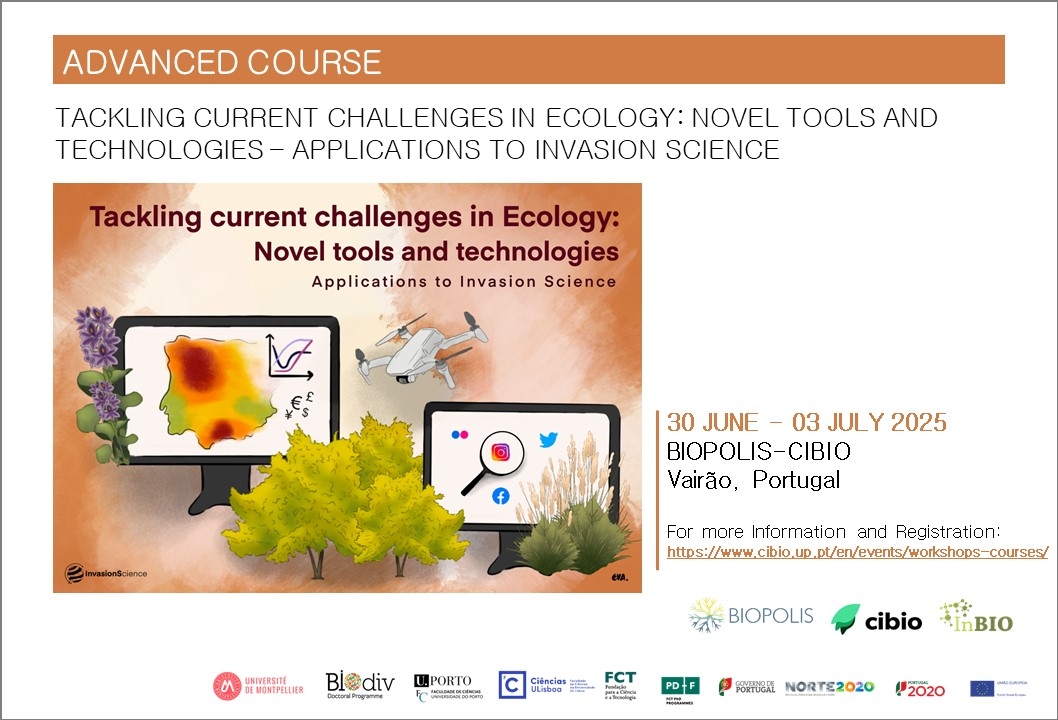Tackling current challenges in ecology: novel tools and technologies – applications to invasion science
From 30 Jun 2025 until 03 Jul 2025 - BIOPOLIS-CIBIO, Vairão, Portugal (Face-to-face)

Biological invasions are a critical driver of environmental change and biodiversity loss. With globalisation accelerating these changes, managing invasive alien species demands robust and dynamic detection and monitoring systems coupled with adaptive response strategies. This advanced course delves into the latest advancements and practical applications of tools and technologies: artificial intelligence, citizen science and iEcology, Remote Sensing and Earth Observation; Static, Hybrid and Dynamic modelling and Economic Tools. .Participants will engage in both theoretical and practical sessions, learning from leading researchers about innovative solutions and their applications across different spatial-temporal contexts.
The course will take place in the Multipurpose Room at Quinta do Crasto - BIOPOLIS Headquarters - https://maps.app.goo.gl/niyncVmhJUdfQkgK7 - every day except for the 2nd of July (Wednesday) in the morning (Open Class / Casual seminar), which will be held in the CIBIO Auditorium.
PROGRAM
Key Areas Covered:
1. Artificial Intelligence in Ecology:
Application of AI and deep learning models.
Enhancing detection of invasive alien species through computer vision.
2. Citizen Science and iEcology:
Leveraging public participation for data collection.
Improving data availability and quality through citizen science initiatives.
3. Remote Sensing and Earth Observation:
Using satellite imagery to detect, map, and monitor biological invasions.
Integrating remote sensing data for real-time monitoring.
Using UAVs to collect data.
4. Modelling Invasive Species Distributions:
Static, dynamic, and hybrid modelling approaches.
Predicting current and future distributions of invasive species.
5. Management of Invasive Species
Economic tools
This course is timely and novel, focusing on the intersection of cutting-edge technology and invasive species management. It addresses the pressing need for innovative and scalable solutions in a globalised world where biological invasions pose increasing threats to ecosystems, economies, and human health. The course aims to provide participants with the knowledge and practical skills needed to develop and implement effective management strategies, thereby contributing to ongoing and future projects in this critical field.
Day 1 (30th of June)
[Morning - Citizen Science and iEcology]
Course Introduction and Objectives
Lecture: The Role of Citizen Science and iEcology
Practical Session: Digital Data Collection Techniques
[Afternoon - Introduction and AI in Ecology]
Lecture: AI and Deep Learning for Ecological Applications
Practical Session Pre-processing data and implementing Computer Vision Models
Day 2 (1st of July)
[Morning - Remote Sensing and Earth Observation]
Lecture: Down on earth and up in the sky – applications of satellite and UAV very-high resolution imagery for invasion mapping and surveying
Practical Session (PART I) – Aerophotogrammetry using UAV’s for remote sensing of plant invaded sites - field session
[Afternoon - Remote Sensing and Earth Observation]
Practical Session (PART I) – Aerophotogrammetry using UAV’s for remote sensing of plant invaded sites - room session
Day 3 (2nd of July)
[Morning - Economics of invasive species - Open Class / Casual seminar] CIBIO Auditorium
Decentralized approaches to natural resource management: Key challenges and implications for policy design
[Afternoon - Economics of invasive species]
The economics of invasive species, from valuation to allocation
Day 4 (3rd of July)
[Morning – Habitat Distribution Models]
Lecture: Introduction to Habitat Suitability Models
Practical Session: Introduction into spatial modelling of ecological niches and conflicts between invasive alien and rare species
[Afternoon – Dynamic/hybrid modelling tools]
Lecture: The Stochastic Dynamic Methodology (StDM)
Practical Session: StDM modelling development and applications
CALENDAR
4 days - 24 hours - Schedule: 10:00 - 13:00 & 14:00 - 17:00
COURSE INSTRUCTORS
Coordination
Joana Vicente | BIOPOLIS/ CIBIO-InBIO
Nicolas Quérou | CEE-M (Montpellier)
Instructors
Pierre Courtois | CEE-M (Montpellier)
Renato Henriques | Institute of Earth Sciences – University of Minho
João Gonçalves | BIOPOLIS/ CIBIO-InBIO
Eva Pinto | BIOPOLIS/ CIBIO-InBIO
Ana Sofia Cardoso | BIOPOLIS/ CIBIO-InBIO
Cristina Lima | BIOPOLIS/ CIBIO-InBIO
Cândida G. Vale | BIOPOLIS/ CIBIO-InBIO
Nuno Mouta | BIOPOLIS/ CIBIO-InBIO
SELECTION CRITERIA
The course will be open to a maximum number of 15 participants.
75% of available student slots are reserved for BIODIV students.
Priority will be given to:
• 1st year and other PhD students attending the BIODIV Doctoral Program;
• PhD students attending other courses;
• Other post-graduate students and researchers.
(A minimum number of participants is required for the course to take place)
APPLICATION
Deadline: 2 May 2025
To apply fill the FORM
A copy of the form will be sent to the email address you provide as proof that you have successfully submitted your application. Results will be emailed to you within 8 working days of the application deadline.
REGISTRATION
80€ (students) | 120€ (other participants).
BIOPOLIS/ CIBIO members will have an additional discount of 20%. Participation is free of charge for BIODIV Students MBGE 1st year Students & CIBIO's TwinLabs
(If applicable, payment will be made to Associação BIOPOLIS - VAT No. 516033727. Information on the payment amount and the payment deadline will be sent together with the results notification, and a proforma invoice may be issued in due time).
MORE INFORMATION
Registration fees do not include accommodation or meals.
No ECTS credits are awarded for attending the course. Participants receive a certificate of attendance without quantitative evaluation.

